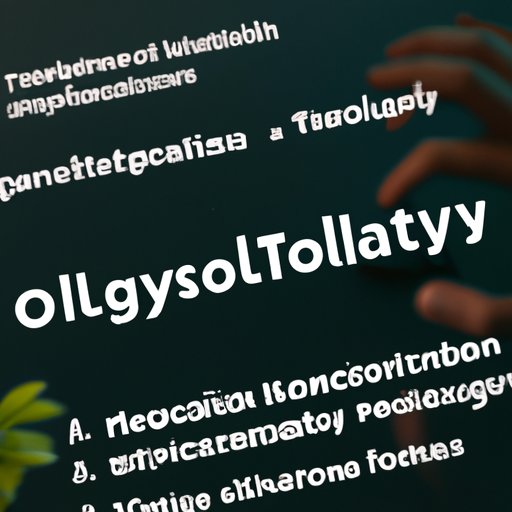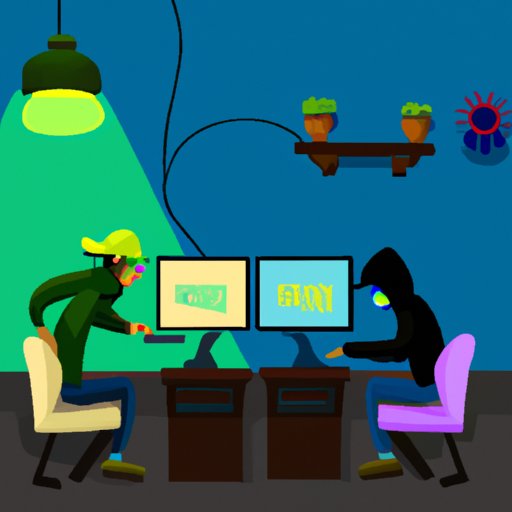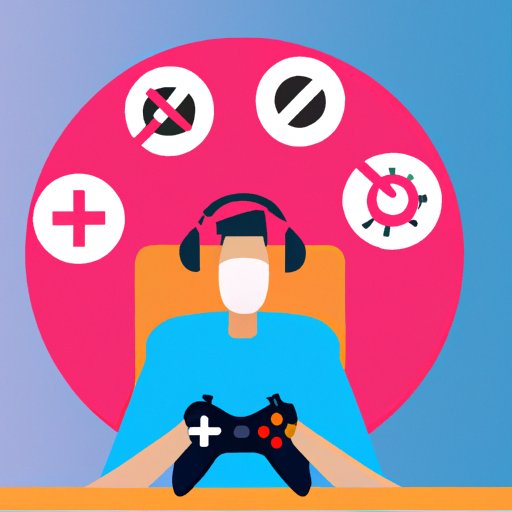Introduction
Gaming culture has been an integral part of the digital world for decades. With the rise of online gaming, gamers have come together to form a vibrant community where they can share their love of games and compete with each other. Unfortunately, this culture has become increasingly toxic in recent years, with many players engaging in abusive and harassing behavior. In this article, we will explore why gaming culture is toxic, the types of toxicity found in the gaming community, and how to combat it.
Examining the Rise of Gaming Toxicity and How it Affects Players
The growing popularity of online gaming has had a major impact on the gaming industry. Online gaming has allowed gamers to connect in ways that were not previously possible, making it easier for them to meet like-minded people and find opponents to compete against. However, this increase in connectivity has also led to an increase in toxic behavior among gamers.
The prevalence of toxic behavior in online gaming is a growing problem. Players often use derogatory language, engage in harassment and cyberbullying, or make threats towards other players. These behaviors can be particularly damaging for younger gamers, who may be more vulnerable to such abuse. The impact of toxic behavior can range from feelings of anger and frustration to anxiety, depression, and even suicidal thoughts.

Discussing the Types of Toxicity in the Gaming Community and Its Impacts
When discussing toxicity in gaming culture, it is important to recognize the various types of toxic behavior that can occur. Examples of toxic behaviors include trash-talking, griefing (intentionally ruining the game for other players), flaming (using offensive language), and trolling (posting offensive comments). These behaviors can have a negative impact on the gaming experience for all players, as well as causing psychological harm to those who are targeted.
The psychological effects of toxic gaming can be far-reaching. Those targeted by toxic behavior may suffer from feelings of helplessness, self-doubt, and low self-esteem. Additionally, those exposed to toxic behavior may become desensitized to it, leading to an acceptance of such behavior as normal. This can further perpetuate the cycle of toxicity in gaming culture.
Exploring the Psychological Aspects of Gaming Toxicity
In order to understand why gaming culture is so toxic, it is important to look at the psychological aspects of the problem. One of the main reasons why gamers become toxic is due to a lack of control over their own emotions. This can lead to a feeling of powerlessness, which can manifest itself in the form of aggressive behavior towards others. Additionally, some gamers may feel a sense of entitlement, believing that they should always win or have things go their way, which can lead to toxic outbursts when things don’t go as planned.
Another factor that contributes to gaming toxicity is the anonymity of online gaming. Players can hide behind a username and act in ways they wouldn’t normally behave in real life. This can lead to a lack of accountability and an increased likelihood of engaging in toxic behavior.
Examining How to Combat Toxic Gaming Culture
If we want to reduce the level of toxicity in gaming culture, then there are several strategies that can be employed. One of the most effective methods is to promote positive interaction and communication between players. This can be done by encouraging players to be respectful, understanding, and supportive of one another. Additionally, game developers can implement systems that reward positive behavior, such as achievements or leaderboards based on good sportsmanship.
Another way to combat toxic gaming culture is to provide players with tools to help them manage their emotions. For example, some games offer “safe spaces” where players can take a break from the game and focus on calming activities, such as listening to music or reading. Additionally, game developers can create systems that allow players to report toxic behavior and block players who are engaging in such behavior.

Investigating the Role of Game Developers in Creating a Safe Gaming Environment
Game developers have an important role to play in creating a safe and enjoyable gaming experience for all players. They can do this by implementing anti-toxic measures, such as filters to prevent offensive language and systems to report and ban players who are engaging in toxic behavior. Additionally, developers can create policies to address toxic behavior, such as issuing warnings or temporary bans to players who violate these policies.

Reviewing the Consequences of Toxic Gaming Culture for the Industry
The consequences of toxic gaming culture can be far-reaching. Not only does it negatively impact players, but it can also have a detrimental effect on the gaming industry as a whole. Toxicity can drive away potential customers, resulting in lower revenue and fewer sales. Additionally, it can lead to a decrease in player engagement, as players may become discouraged from playing if they are constantly subject to toxic behavior.
To combat this problem, game developers must take steps to reduce toxicity in the gaming community. This can include implementing anti-toxic measures, developing policies to address toxic behavior, and providing players with tools to help them manage their emotions. Additionally, game developers should encourage positive interactions between players and promote a culture of respect and understanding.
Conclusion
Toxic gaming culture has become a growing problem in the gaming industry, with many players engaging in abusive and harassing behavior. This behavior can have a damaging impact on players, both psychologically and emotionally. To combat this problem, game developers must take steps to reduce toxicity in the gaming community and promote positive interactions between players. By doing so, they can create a safe and enjoyable gaming experience for everyone.
(Note: Is this article not meeting your expectations? Do you have knowledge or insights to share? Unlock new opportunities and expand your reach by joining our authors team. Click Registration to join us and share your expertise with our readers.)
